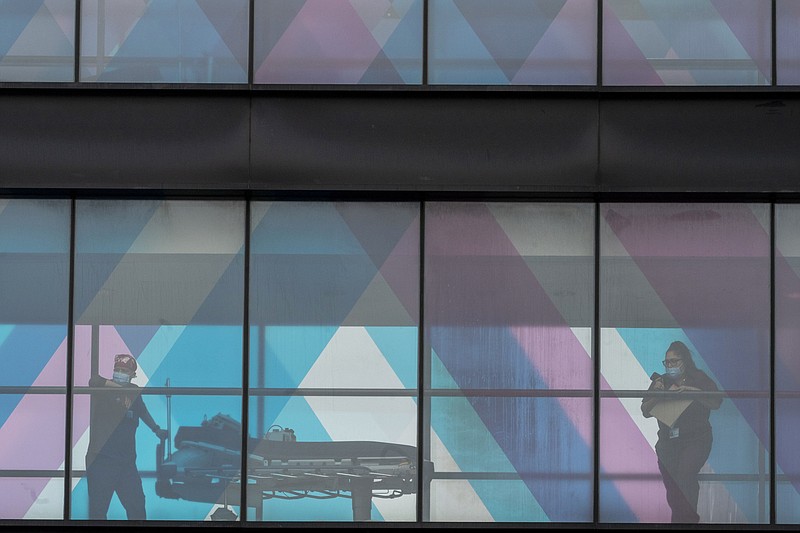Do you play the percentages?
If so, you may want to know that your chances of having a heart attack below the age of 45 are between 4% and 10%. If you're aged 50 or more and haven't had cancer, your chance of being diagnosed with it in the next 10 years or more is only 6.57%.
The COVID-19 pandemic has given us a whole new world of percentages to play. For example, you might have taken the chance to never wear a mask in public at the outset of the virus and hoped you'd never get sick. Or you might have been around somebody who was sick and figured you'd never get it.
Or perhaps you decided to skip the vaccine because you were sure you weren't going to get COVID-19 or that your concerns about a vaccine outweighed the chances that you might get sick.
The latest omicron variant - omicron being the 15th letter in the Greek alphabet - has offered even more percentages.
Using the Tennessee Department of Health numbers, one can learn that over the past week fully vaccinated state residents have about a .035% chance among all fully vaccinated state residents of being infected, up from about an .008% chance a month ago. Pretty minuscule.
Residents who are not fully vaccinated have increased their percentage from an .024% chance among all residents not fully vaccinated a month ago to .068% over the past week. Still pretty small.
The Centers for Disease Control and Prevention (CDC) added some odds Monday, saying two doses of the Pfizer or Moderna vaccine are about 35% effective against the highly infectious omicron variant, while having a booster of either brings the odds back to 75% effective.
CDC numbers from earlier this month show that about 75% of the people in the United States who have died from the COVID-19 virus have been ages 65 or older, or about one in 100 COVID deaths. For people younger than 65, your chances of dying from it are about one in 1,400.
If you want to drive yourself crazy, you can find any number of statistics to back up your choice about how you handle the pandemic. If you're determined not to wear a mask, not to social distance at any time and in any place and not to seek a vaccine, you can find numbers to back up your reasons. Perhaps you think until the chances are more than 50-50 that you'll get the virus, you'll stand pat.
We look at it differently.
Although the chances of our house burning down are about one in 3,000, we have insurance on our home. While our chances of being in a car accident are one in 366 for every 1,000 miles driven, we have automobile insurance.
(No, if you're wondering, we haven't paid something to somebody somewhere for a car warranty, but at least once a day someone calls our cellphone to let us know we need to take care of that immediately.)
Our parents, who likely never looked up statistics in an old-school World Book about the chances we'd get a dreaded disease, had us vaccinated for polio, diphtheria, typhoid, tetanus and perhaps a few other maladies we don't remember.
They imposed curfews on staying out past certain times, not relaying on percentages but knowing that after a certain time the odds of something bad happening would only increase.
Annually, we get a flu vaccine, despite the small chances we'd get the flu. And, to this day, we've never had the flu for which a vaccine was available, though in 2019 we had what doctors said was a different strain.
For all those reasons and more, we stand by our decision to recommend a COVID-19 vaccine and whatever boosters are recommended by medical experts.
We said near the start of the pandemic - fully confident in our statement - that the virus came with no playbook, and that no president, no Democratic presidential contender, no CDC official, no World Health Organization expert, no Dr. Fauci, nobody, could say for sure what would happen.
But we knew when a vaccine became available, we wanted to take it. We wanted to resume seeing friends, gathering with family members, returning to somewhat of a normal life. We knew no vaccine would be 100% effective, but we looked at it as being the best insurance policy we had for the life we knew in February 2020.
Two doses? OK, we're in. A booster? All right, we'll take it.
What's next? A yearly booster? How soon do we roll up our sleeve?
Are we sheeple for doing this? We don't think so.
Yes, some vaccines have had side effects. Yes, we've needed more than one dose. Yes, there are many breakthrough cases. Yes, there will probably be more variants.
But life is a crapshoot. However, we're anxious to wring as much out of it as we can, and if that means battling deltas and omicrons and any sigmas and upsilons and omegas that come along with vaccines, we'll do it.
If you haven't been vaccinated, think about starting 2022 by taking that step. For yourself, for your family, for your friends and for your fellow man.
